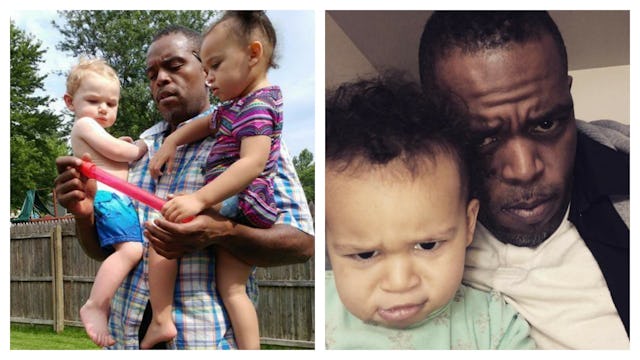What 'Having A Village' Looks Like

Growing up, I frequently heard the old saying “it takes a village.” As a child, I interpreted this to mean that when I was caught doing something I was not supposed to, watching neighbors or my friends’ parents had the right to discipline me and I must listen to and respect them. But one day my husband shined a new light on this timeless proverb, and taught me and our children a lesson I will not soon forget.
My husband is a 6’3″, 200+ pound black man raised in the inner city by a strong-willed, single mother in the ’70s and ’80s who refused to allow him to become a casualty of the streets that surrounded him. She had (and still has) a huge heart and a strong hand, refusing to allow him to step out of line and, thus, instilling high morals and a strong character. As an adult, he exudes an air of authority and naturally demands respect from children and peers alike, often coming off as intimidating.
Over a year ago, we moved into a townhouse which backs up directly to a neighborhood park. Sitting in our back yard, enclosed in by a chain link fence, we have a view of the entire park. A few months after settling in, I became aware of a group of children who frequent this park. Every day the same 5-8 boys ranging from 8 to 12 years old would come and play.
Daily, I would hear curse words flowing out of their mouths. One particular afternoon, after hearing a little boy use a more than graphic explanation of a woman’s reproductive organs, I shouted over the fence at them to stop using that language or to leave the park. I received eye rolls and heard a few snickers as I packed up my three children to head inside.
Fast forward a year; spring had finally begun to sprung and the children had come back out of hibernation. Of course, the first group of kids I see returning to the playground are these foul-mouthed boys. At the time, we were having a family birthday party for my one-year-old. My oldest daughter and her friends went to go play at the park. After being called back home for cake, the group of boys came up to our fence and shouted over to us. My daughter had left her Nerf bow and arrow at the park and they were returning it. My husband told the boys to all wait at the fence for him and disappeared into the house.
He came back out moments later, to the group of boys looking a little unsure. My husband has a very strong voice and a natural scowl; even when he is complimenting you, it can look and sound as if he is going to scold you. The boys clearly did not know what to expect. He took the opportunity to introduce himself as Mr. Markus. He told them how proud he was that instead of taking the bow and arrow home (which they easily could have done) or simply leaving it, they had done the right and honest thing by returning it.
The boys took this in, nodding and listening as he spoke. He passed over a bag of candy to one of them and told them to split it up between themselves. As they each dug into the bag, he told these boys, “I was once a young kid too. I know what it’s like to want to curse, and push the boundaries. But, when you see my family, and my little girls out here, I do not want to hear any of those words you were using earlier.”
Those boys looked up at him and all nodded in unison, with “Yes sirs” and “Okay, Mr. Markus.” He told them to have a good night and left them to enjoy their candy.
Today, while my husband was at work, there was a knock on my door. The group of boys was standing there, holding one of my daughter’s arrows which had gotten lodged up high in a tree. They told me they had spent all afternoon throwing things up at the tree to get it down for my daughter. With radiating smiles on their faces, they asked me to tell Mr. Markus that they had brought it over. I could see how genuinely pleased they were with themselves for doing this good deed, and I have to wonder if they would have done it if my husband had not given them that talk the day before.
It is so easy to scold our children and discipline them when they have done wrong. Shortcomings and mistakes are quick to be noticed. But how much does yelling truly accomplish? In showing these kids respect, acknowledging their good behavior, and then using it as a teachable moment, my husband made a lasting impression on these young boys — one that they will hopefully carry with them into adulthood and pass down to the next generation.
This is how the village needs to raise respectful, kind, caring children.
This article was originally published on